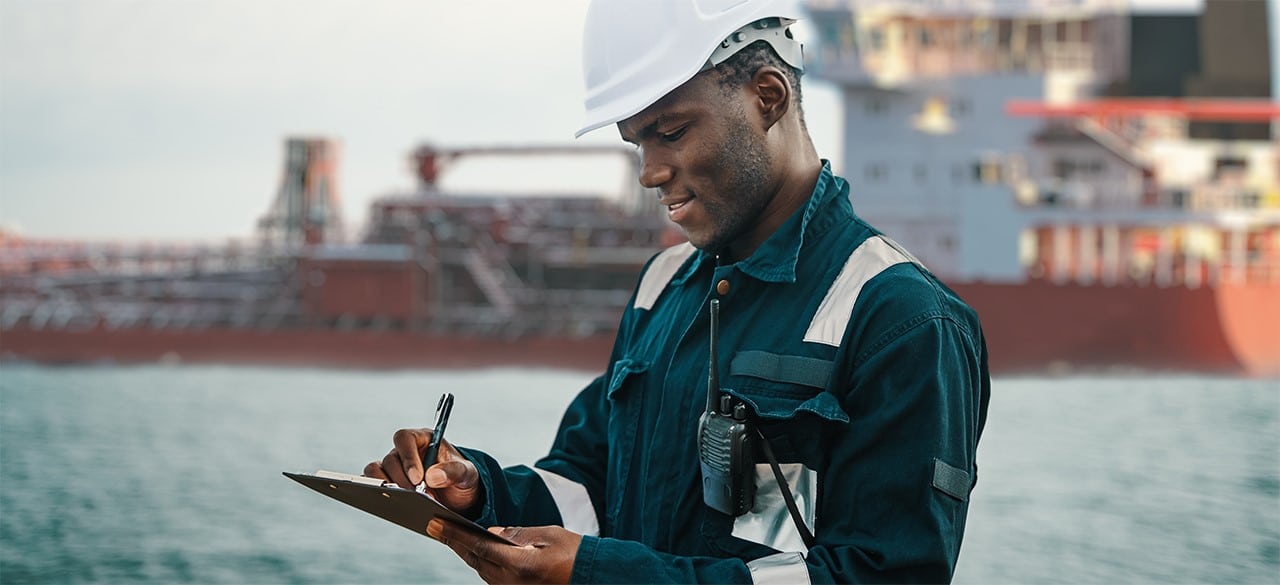Computer Based Training (CBT) training matrix for Tanker Management Self Assessment (TMSA) elements as addressed by OCIMF in TMSA 3. According to OCIMF:
The Tanker Management and Self-Assessment (TMSA) programme provides companies with a means to improve and measure their own safety management systems. The programme encourages companies to assess their safety management systems (SMS) against key performance indicators (KPIs) and provides the minimum standard expected (level 1) plus three levels of increasing standards or performance. The self-assessment results can be used by operators to develop phased improvement plans that support continuous improvement of their ship management systems. Companies are encouraged to regularly review their self-assessment results and develop plans for improvement. Aligning policies and procedures with industry best practice helps companies to improve and attain increasingly higher standards of safety and pollution prevention management.
What is TMSA 3?
OCIMF introduced in 2004 the TMSA programme – Tanker Management & Self-Assessment, in an effort to make the operators show stronger commitment to safety and environmental protection. TMSA provides tanker companies with a means to improve and measure their safety management systems. In 2017, OCIMF released TMSA 3, the third edition of TMSA, with the relevant revised Key Performance Indicators and the revised best practices guidance.
What are the key elements of TMSA 3?
The 13 key elements of TMSA 3 are as follows:
- Leadership and the safety management system
- Recruitment and management of shore-based personnel
- Recruitment, management, and wellbeing of vessel personnel
- Vessel reliability and maintenance including critical equipment
- Navigational safety
- Cargo, ballast, tank cleaning, bunkering, mooring and anchoring operations
- Management of change
- Incident reporting, investigation, and analysis
- Safety management
- Environmental and energy management
- Emergency preparedness and contingency planning
- Measurement, analysis, and improvement
- Maritime security
How can SQLearn assist my company with TMSA 3?
SQLearn’s e-learning system has been designed with TMSA 3 requirements in mind. During the development, we focused on aspects required by TMSA 3 like electronic reporting of training activities as well as creating digital procedures for trainees and evaluations of the provided trainings. Furthermore, SQLearn’s e-learning system is an open system that can provide reports for any training activity performed by a shipping company. Additionally, the system allows monitoring of training activities for both seafarers and ashore personnel giving a complete overview for the company and minimizes required preparations for each audit as it eliminates the need to manually aggregate reporting data from several sources.
SQLearn offers CBT with e-learning courses that are designed according to the industry’s best practices and can increase training efficiency, while looking into the latest maritime developments and delivering all the following information crew managers need in a targeted and comprehensive way to achieve compliance with TMSA 3.
Courses that cover TSMA requirements
The purpose of this guide is to link SQLearn’s e-learning courses to the 13 key elements of OCIMF’s Tanker Management & Self-Assessment, in order to assist tanker operators to achieve compliance with TMSA 3.
TMSA Element 1
- Ship Safety Officer
- Behavior Based Safety
- Cyber Security Awareness Onboard
- Lessons learnt – Marine Environmental Awareness Incident
TMSA Element 3
- Onboard Ship Assessment
- Train the Trainer
- Presentation Skills
- MLC 2006 – Ratings
- MLC 2006 – Officers
- Effective Communication Onboard Ships (Communicate Effectively & Assertively in a Multicultural Environment)
TMSA Element 3A
- Safety Food Sanitation System
- Fatigue Awareness and Management
- MLC 2006 – Ratings
- MLC 2006 – Officers
- Health and hygiene
- Housekeeping
- Food Safety
TMSA Element 4
TMSA Element 5
- ECDIS System & Electronic chart types
- Voyage Planning & Route monitoring with ECDIS
- Onboard Ship Assessment
- COLREGs, rules of the road
TMSA Element 6
- Fuel Bunkering operations
- Bunker Fuels Ops & Malpractices
- VOC Management
- STS Transfer Operation (TNK)
- Ballast Water Management – Legislation
- Ballast Water Treatment – Technologies
- Ballast Water Treatment – Operation
- Ballast Water Treatment – Maintenance & Troubleshooting
- Ballast Water Management – Compliance, Monitoring & Enforcement
TMSA Element 6A
- Guide on Safe Mooring Operations & Procedures
- Lessons learnt – Mooring incident I: Operation with a tugboat
- Lessons learnt – Mooring incident ΙΙ: Parted spring line
- MLC 2006 – Officers
- MLC 2006 – Ratings
TMSA Element 7
TMSA Element 8
TMSA Element 9
TMSA Element 9A
TMSA Element 10
- Ship’s Garbage Management Plan & Garbage Record Book
- Ship’s Garbage Management Plan
- Fuel Oil Changeover Procedures
- IMO Sulphur Cap 2020
- VOC
TMSA Element 11
- Plans and procedures for recovery of persons from water
- Ship’s SOLAS Training Manual (FFE) – Part I: Theory of fire & Fire Extinguishment (Operational)
- Ship’s SOLAS Training Manual (FFE) – Part I: Theory of fire & Fire Extinguishment (Management)
- Ship’s SOLAS Training Manual (FFE) – Part II: Structural Fire Protection
- Ship’s SOLAS Training Manual (FFE) – Part III: Fire Fighting Equipment
- Resilience – Module 6: Dealing with crises
- Fire in the Engine Control Room
TMSA Element 13
- Cyber Security Onboard
- Security Awareness Training for all seafarers (A-VI/6-1)
- Security Training for seafarers with Designated Duties (A-VI/6-2)
What are the key benefits of SQLearn’s CBT?
SQLearn provides a library of e-learning courses that cover most international, national and flag requirements and are of great importance in the field of safety training. All e-learning courses are designed according to the latest e-learning standards, are interactive and use multimedia elements, like narration and 3D videos. Moreover, they are also offered as CBTs using a dedicated USB flash disk or using an innovative hardware solution for onboard training called Dolphin Box. Using Dolphin Box, the crew manager can manage and monitor the training process across the fleet in real-time while all seafarer trainings (e-learning, ashore trainings, drills) are kept in a complete seafarer training record. SQLearn’s e-learning courses for maritime are certified according to relevant ABS standards.






